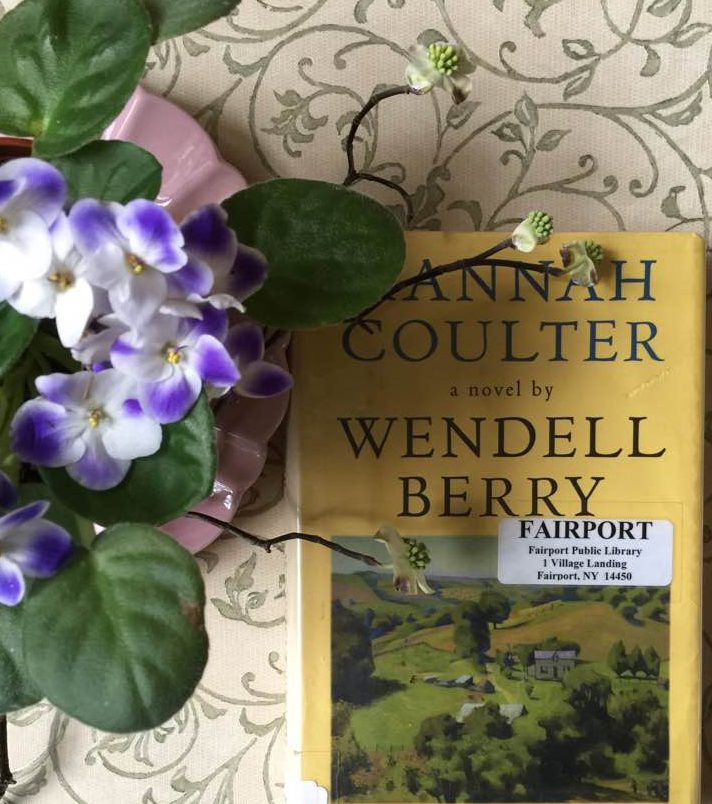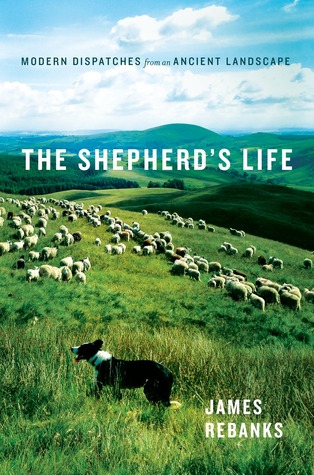
“She was a good cook, but she also did the main work that kept us eating. She made the garden, and all we didn’t eat fresh she preserved and stored for the winter. She took care of the hens and the turkeys. She milked two cows. My father was in charge of the meat hogs, but Grandmam was the authority and head worker at the butchering and sausage making and lard rendering and the curing of the meat. In the summers she, and I with her, roamed the fencerows and woods edges and hollows to pick wild berries for pies and jam. She was always busy. She never backed off from anything because it was hard. She washed and ironed, made soap, sewed and patched and darned. Every Saturday she carried a basket of eggs and a bucket of cream to the store at Shagbark.” Hannah Coulter, by Wendell Berry
Hannah Coulter is a great book club choice. I think that reading Wendell Berry’s novels, essays, and poetry over several months could spark conversations so relevant to our times.
I read somewhere of a woman who began inviting liberals and conservatives to occasional dinners after the election. Maybe forming a book club of this nature, and reading the work of Wendell Berry and others (J.D. Vance‘s Hillbilly Elegy: A Memoir of a Family and Culture in Crisis and Janesville: An American Story by Amy Goldstein come to mind) could be one way to help us better understand one another and heal our cultural divide.
As I wrote in my previous post, Berry doesn’t subscribe to strictly liberal or conservative thinking. Influenced by this Baptist faith and deep bonds with the Kentucky farming community of his birth, he has over a lifetime and in a large body of work mapped out a moral code for living ethically on this earth, with compassion toward each other and a deep understanding of what the land we live on requires of us.
At eighty years of age, Hannah Coulter looks back on her life. When she was a girl, her mother died and was soon replaced with an uncaring stepmother. When Hannah was a young wife and mother-to-be, her husband, Virgil, was killed in World War II. A few years later, Hannah married Nathan, a war veteran who fought at Okinawa. Together they raised three children. Hannah’s is a story of farming and family in a close-knit Kentucky community, a way of life that she recognizes is vanishing.
Or is it? The ending of this short but powerful novel offers signs of hope that maybe it is not. Even though I haven’t lived the farming life, I care about its preservation and resurgence, so I loved the ending of this novel.
Hannah Coulter spoke to me on many fronts, and left me unsettled, too.
After 20+ years in our home raising two children, we’ve been getting ready for a garage sale and deciding what to part with. These words resonated:
“And then we got married and moved in.
Those were fine days. Everything we did seemed to start something that was going to go on and on. I’ll never forget the feeling it gave me just to make this house clean, to fill it with fresh air and the good smell of soapy water, to wash the dingy windows and see the rooms fill with light, to get here one morning and find that Nathan had mowed the yard, sparing the day lilies and the rambler rose. I cut a few blossoms and stuck them in a jar of water in the living room.”
By far, though, one of the most powerful sections of Hannah Coulter for me was when, after Nathan’s death, Hannah goes to the library so she can find out what the Battle of Okinawa was all about. Nathan had never spoken of the war or that terrible battle.
I understand Hannah’s impulse to want to know this about her husband. Writing my memoir, I’ve found it challenging to write intelligently and fairly about my parents in a full-bodied, compassionate way. Parents keep stories from their children and remain enigmas long after they are gone.
A few years after my father died, we went to Metz, France, a town he helped liberate in World War II when he was about my son’s age. We saw the countryside where he was wounded and visited the American cemetery with thousands of white crosses as far as the eye could see. My father always told war stories that fascinated me, but I’d never really known much about the Battle of Metz–what a suicidal mission it was. That day in France, when we found the grave of a young man in my father’s battalion who was killed the same cold November day Dad was wounded, I realized in a way I never had before how much my father must have been censoring when he told his stories.
When Hannah goes to the library, she wants to know what Nathan experienced during the Battle of Okinawa. She wants details: what he saw, heard, smelled, touched, and tasted. Wendell Berry gives these to her, in spades. He reminds her, too, of the Japanese farmers and their families who were there when the bombs rained down.
Wendell Berry isn’t keen on runaway capitalism and the industrialization of farming, and I think this powerful chapter about Hannah researching the Battle of Okinawa is, in part, an indictment of the military-industrial complex.
“Want of imagination makes things unreal enough to be destroyed. By imagination I mean knowledge and love. I mean compassion. People of power kill children, the old send the young to die, because they have no imagination. They have power. Can you have power and imagination at the same time? Can you kill people you don’t know and have compassion for them at the same time?”
Over Easter weekend, I heard someone report, with great satisfaction, of the rising ISIS death toll from our “mother of all bombs,” as troops cleaned up and found more bodies.
Some final, true, and thankfully uplifting words, from Hannah Coulter:
“The world is so full and abundant it is like a pregnant woman carrying a child in one arm and leading another by the hand. Every puddle in the lane is ringed with sipping butterflies that fly up and flutter when you walk past in the late morning on your way to get the mail.”
I’m better off for having read Hannah Coulter. I draw inspiration from these words about Grandmam, and have written them in the notebook where I record and track my creative work:
“She never backed off from anything because it was hard.”
One of the Wendell Berry novels recommended by readers of this blog is Jayber Crow: The Life Story of Jayber Crow, Barber, of the Port William Membership, As Written by Himself, so that is the Berry novel I plan to read next. (Jayber has a few cameo mentions in Hannah Coulter.)
Here is an in-depth discussion of Hannah Coulter on The Diane Rehm Show:
https://dianerehm.org/shows/2010-11-24/readers-review-hannah-coulter-wendell-berry


